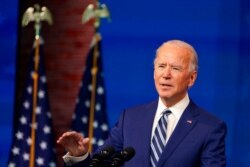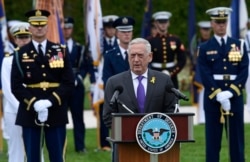President-elect Joe Biden has officially announced retired U.S. Army General Lloyd Austin as his pick for Secretary of Defense.
“In my judgment, there is no question that he is the right person for the job of leading the Department of Defense at this moment in our nation’s history,” Biden said Wednesday from his hometown of Wilmington, Delaware.
Underscoring the need to have a diverse administration, Biden said the country needs Austin’s “personal experience” to ensure that the U.S. military “reflects the full strength and diversity of our nation — that Black, Latino, Asian American, Native American, women and LGBTQ service members are treated with dignity and respect.”
If confirmed by the Senate, the four-star general would be the first African American to serve as defense secretary. But his confirmation is already facing opposition because he has been in retirement for less than five years.
U.S. law requires defense secretaries to be out of active-duty military for at least seven years to preserve civilian leadership of the military — a fact that Biden acknowledged as he underscored the importance of civilian control over the military.
“There are good reasons for this law that I fully understand and respect. And I would not be asking for an exception here if I did not believe this moment in our history didn’t call for it, and if I didn’t have the faith I do in Lloyd Austin to ask for it,” Biden said.
In remarks following his nomination announcement, Austin expressed “deep appreciation and reverence” for civilian control of the military.
“I look forward to surrounding myself with experienced, capable civilian appointees and career civil servants who will enable healthy civil-military relations grounded in meaningful civilian oversight,” he said.
There have been two instances in which Congress has provided a waiver for retired generals to serve as defense secretary. The first was in 1950 for retired career Gen. George Marshall. The last was in 2017 for retired Gen. Jim Mattis.
Some members of Congress, including members of Biden’s own party, have already expressed hesitation to provide a waiver for Biden’s pick, especially so soon after one was provided for Mattis.
“I have deep respect for Gen. Lloyd Austin … but choosing another recently retired general to serve in a role that is designed for a civilian just feels off. The job of secretary of defense is purpose-built to ensure civilian oversight of the military,” Democratic Congresswoman Elissa Slotkin of Massachusetts said in a statement Tuesday.
Sen. Jack Reed of Rhode Island, the top Democrat on the Armed Services Committee, indicated in 2017 that the congressional waiver for Mattis should be a “once-in-a- lifetime occurrence,” and that he would oppose future waivers for the post.
But House Majority Leader Steny Hoyer gave his support for Austin. In a statement Wednesday, Hoyer said Austin is someone who “by all accounts would bring enormous substance and talent to the Pentagon" and hopes that his nomination “moves forward.”
Value of alliances
Biden said that Austin shares his “deeply held belief in the value of America’s alliances,” signaling that his administration intends to return to multilateralism and rebuilding relationship with allies that Democrats say have been damaged under President Donald Trump.
“He is just as committed as I am to rebuilding and modernizing those alliances — from the Asia Pacific to Europe and around the world,” Biden said.
Echoing Biden’s statement that “America is strongest when it works with its allies,” Austin said he understands the role the Defense Department plays in maintaining stability, deterring aggression, defending and supporting critical alliances around the world, including in the Asia Pacific region, in Europe and around the world.
Biden first announced Austin's nomination in an article for The Atlantic, in which he called the retired general a "true and tested soldier and leader … uniquely matched to the challenges and crises we face."
Born in 1953 in the southeastern state of Alabama and raised in neighboring Georgia, Austin graduated from the U.S. Military Academy West Point in 1975 and rose through the ranks during his four-decade career, beginning as a commander of a combat support company with the legendary 82nd Airborne Division based at Fort Bragg, North Carolina.
He eventually rose to the rank of lieutenant general and assumed command of Fort Bragg before becoming commander of U.S troops in Iraq from 2010 to 2011, where he oversaw the end of the U.S.-led invasion of the country and the withdrawal of all U.S. forces.
Austin was the first Black officer to serve as the Army’s Vice Chief of Staff in 2012 and the first Black officer to head U.S. Central Command (CENTCOM), which covers operations in Iraq, Afghanistan and across the Middle East and South Asia. He served in that post from 2013 until his retirement in March 2016.
Austin earned praise for both his intellect and strong leadership skills among civilian and military leaders. Then-President Barack Obama said upon Austin's retirement that his “character and competence exemplify what America demands of its military leaders.”
But the general came under fire by lawmakers in 2015 over a $500 million program that ultimately trained just a handful of Syrian fighters.
Michael O’Hanlon, a senior defense fellow at the Brookings Institution, said, “Gen. Austin is a soldier’s soldier in many ways, but he will have a steep learning curve going from his CENTCOM experience to handling great-power competition, high-tech military modernization and other top priorities” needed to counter a growing threat from China and Russia.
“He is an unorthodox choice for that reason — though it doesn’t mean necessarily that he’s a bad choice,” O’Hanlon said.
The Biden-Harris transition team said Austin will be tasked with implementing the military and defense priorities, including “executing the logistics associated with COVID-19 vaccine distribution; restoring America’s alliances; supporting and equipping service members and caring for them and their families; addressing the accelerating security threat posed by the climate crisis; modernizing America’s armed forces and preparing for the conflicts of the future; and keeping the nation safe and secure.”
VOA's Richard Green contributed to this report.






